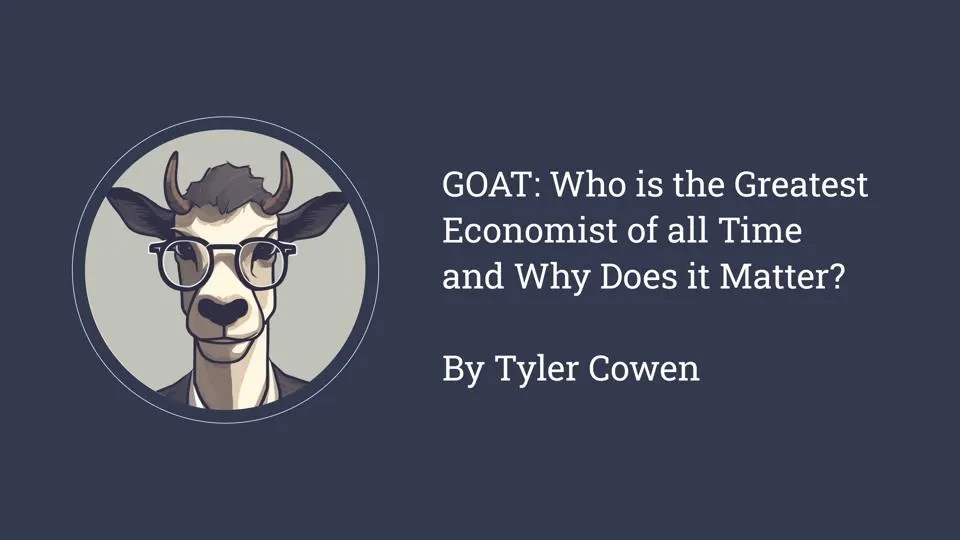Read the original article on Forbes.com
GOAT: Who is the Greatest Economist of all Time and Why Does it Matter? is an intriguing book by the well-known economist Tyler Cowen in which he tries to determine who is the greatest economist of all time. This book will be enjoyed not only by economists but also those interested in understanding the world of people and their interactions. Importantly, the book emphasizes the non-financial implications of economic analysis in areas such as friendship, community and aesthetics.
Tyler (as the book’s chatbot refers to him) is a professor at George Mason University and one of the contributors to the Marginal Revolution blog. He has read deeply in the history of economic thought and widely on a breadth of topics. He brings both depth and breadth to this work.
The search for the greatest economist is presented almost as a mystery, in which Tyler considers various candidates as well as some who didn’t quite make the short list. He holds his conclusion until the last chapter, and this review will not spoil the suspense.
Criteria for the Greatest Of All Time are: “The economist must be original, of great historical import, serve as a creator and carrier of important ideas, have a hand in both theory and empirics, have a hand in both macro and micro, and be ‘not too wrong’ on the substance of issues. Furthermore, the person also must be a pretty good economist! That is, if you sat down with the person and discussed economic issues, you would be in some way impressed.”
The candidates are Milton Friedman, John Maynard Keynes, Friedrich Hayek, John Stuart Mill, Thomas Malthus and Adam Smith, with almost-short-listed Alfred Marshall, Paul Samuelson, Kenneth Arrow, Gary Becker and Joseph Schumpeter.
Economics is about far more than dollars and cents, and for all of the candidates Tyler highlights their concern for non-financial matters. For example, Keynes is quoted as saying that love is first of the prime objects in life. Smith wrote about humans’ tendency toward empathy and desire for social harmony. Hayek believed that one virtue of the free market is the greater ability of individuals to pursue their individual goals, including non-financial interests.
Although Wall Street and macroeconomic policy come to most people’s minds as economic topics, GOAT +0.1% emphasizes the wide range of concerns that great economists have addressed. Arrow’s most famous work concerns voting systems. Mill used economic analysis to condemn limitations on women’s rights.
Tyler also considers economists’ failures. Friedman’s emphasis on money supply has not held up well, and Malthusian doom-and-gloom failed to anticipate huge gains in agricultural productivity as well as increased use of birth control. Tyler also looks at whether they should be cancelled, showing warts (Keynes’ enthusiasm for eugenics, for example) along with their great insights.
In a startling advance for book publishing, GOAT comes with a chatbot in which a user can ask the AI to answer questions related to the book. In writing this review, I used the chatbot to refresh my memory about Tyler’s criteria for greatness and for examples of non-financial concerns. The chatbot uses the same technology that enables AI to answer specialized questions for customer service by accessing a company’s owners’ manuals, returns policy and troubleshooting guides.
GOAT: Who is the Greatest Economist of all Time and Why Does it Matter? is available free in PDF or e-book. The chatbot for the book can also be accessed on the book website.

0 Comments